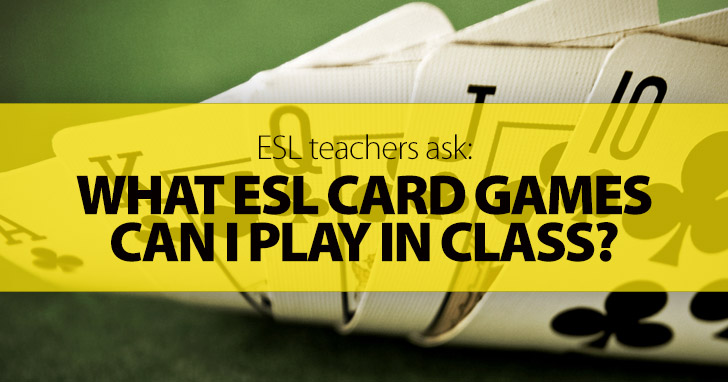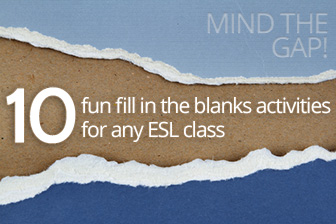ESL Teachers Ask: What ESL Card Games Can I Play in Class?


They’re easy for teacher’s to create, easy for students to complete, and may be designed for any vocabulary list or verb tense. Since they’re so common in the ESL class, why not give them a new, fun twist? Here are some ideas for blanks your students will enjoy filling.

This exercise imitates the style of storybooks that have gaps in the story filled with pictures. This is probably the best type of gap-filling activity with very young learners, especially those who can’t read or write just yet. Copy a short story onto a Word document. Delete some of the key vocabulary and paste some small pictures into the gaps to represent the word you deleted. You’ll have to fiddle with the formatting, the size of the images and spacing of the Word document, but it’s not that hard to do.
If your students can read, they read the story and fill the blanks with the help of the illustrations. If they can’t read, you do the reading and pause to allow them to look at the picture and fill in the blanks.
This is a variation of the activity mentioned above. Give each of your young learners a copy of the same story with the blanks in the text. Make sure that the blanks are big enough, i.e. that there is enough space for students to fill the gaps with their own drawings. Check answers by having students take turns reading the story out loud.
This is another way to practice key vocabulary. Write some sentences on the board and ask students to read them out loud. Then proceed to erase the key vocabulary. Ask students questions to fill in the blanks: Sarah wants to buy a _____. What does Sarah want to buy?
This is a classic and one that many of you have probably already tried, but it can’t be left out of a list of great gap-filling exercises. Play a song for your students to listen to and provide the lyrics with blanks they must fill. You can handle the exercise in a number of ways. You can play the song and then give them lyrics to complete, or you can play the song while they fill the gaps at the same time.
This is exactly like the Musical Blanks only in this case you use a short video: a scene from a sitcom, a YouTube video, or a CNN news video for more advanced learners. You’ll probably have to create the script yourself in most cases, but BusyTeacher.org has plenty of scripted videos you can use!
A great way to teach vocabulary is to introduce it through very common pairings, for example: apples and bananas; bacon and eggs; black and white; mom and dad; burger and fries, etc…Create a set of cards in which only one of the words appears: ____ and fries; burger and _____. Ask students to pick up a card and fill in the blank.
This game is similar to the game of Snap! Write sentences with gaps on small cards to create your deck of cards. Make sure that you include sentences with blanks that may be filled with the same word, for example: “_____ are red” and “I like to eat _____ and bananas”. Both can be filled with the word “apples”. Students take turns turning over cards and shout “Snap!” when the blanks on the cards may be filled with the same word.
This is another game you can play with the same cards you use for Snap! In this case place all of the cards face down. Students take turns flipping them over, two at a time. The goal is to find two cards with blanks that may be filled with the same word.
Divide students into two teams. Give one student a card with a sentence that has a blank. The student must figure out which word goes in the blank and then give the team clues as to what the word is. Say you’re teaching a lesson that includes sports vocabulary. Sentence: David Beckham plays _______. The student has to provide clues about the sport without reading the sentence or mentioning the player’s name: It’s something you play with a ball. You play it in a field. Each team has 11 players, etc…
Fill in the blanks AND practice pronunciation at the same time. For this type of activity you can either put a phonemic symbol for each blank, or a word that includes the same phoneme. Example: “I asked my mother to _(lie)_ me a new book bag”. Answer: buy
Make them a little more challenging; make them different!
Have you ever given your ESL class a gap-filling activity that was a little different from the norm? Tell us all about it!